
| « Junin De Los Andes | The Collapse of the Perito Moreno » |
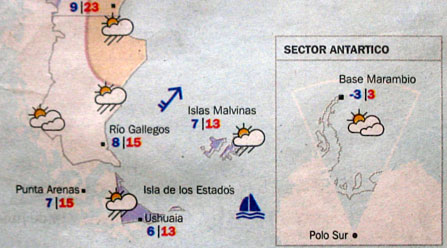
On first coming to Argentina, I was amused to find that every map of the country included a little pie-slice of Antarctica. Whether it was the bus map, the television weather forecast, or the Aerolineas Argentinas in-flight magazine, no map of Argentina was complete without the two dots of the Falklands Islas Malvinas and a little inset in the corner showing a blank wedge of Antarctica, much in the way American maps will sometimes show Alaska. And the very large avenue at the foot of my local park was called Antártida Argentina. I figured something must be up.
It turns out that everybody wants a piece of Antarctica. If you picture the continent sliced through the pole like a pizza, Argentina, Chile and the United Kindgom are all fighting over the slice nearest the South American continent. Norway and New Zealand each claim a slice of their own. Australia extravagantly cuts itself a third of the continent, minus a tiny sliver for France. And a quarter of Antarctica goes unclaimed by anyone (the only part of the world with this status). The latest entrant in the fun is Brazil, which despite being on the equator and having no history of Antarctic exploration whatsoever has declared an area of interest in the continent, and promotes a complicated plan in which South American countries get partial shares in proportion to how much of their coastline faces the south pole. Guess who has the most frontage.
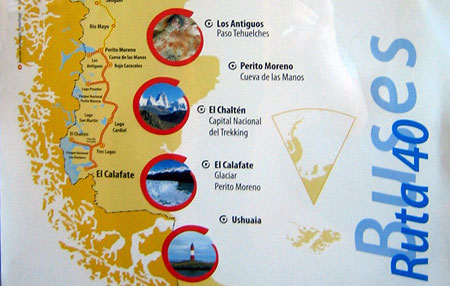
There is something about frozen wastelands and high latitudes that makes even meek nations go all loopy. Consider Denmark and Canada, two powers who are not normally known for saber-rattling, yet who have recently indulged in flagsmanship over a little piece of rock called Hans Island, north of Greenland. The battle began in 1984, when the Danish Minister for Greenland threw down the gauntlet by chartering a helicopter to the island and leaving a bottle of cognac in a cairn along with a note reading "Welcome to a Danish island". Subsequent Danish expeditionary forces visited the island to set up a flag, each time arriving to find it gone, although they came to believe this had more to do with with wind then Canadian perfidy. The Canadians retaliated by going in with a flag of their own, and deploying a secret weapon - the Canadian Minister of Defence, who visited the large rock in person. The Danish response was pure genius: they politely asked Canadian permission to send a warship to Hans Island. Since the Canadian Navy didn't actually have an ice-hardened warship that could reach Hans Island itself, it had to grant the Danes permission or risk looking impotent. The confrontation is now on hold until the Canadians can figure out a way to reach this integral part of their homeland and, in the memorable phrase, "assert Canadian sovereignty".
This display pales next to the stunts that have been pulled in Antarctica. In 1978, Argentina sent a military officer and his pregnant wife over so that the first child born in Antarctica would be an Argentine. They also sent a super-secret military expedition to the South Pole in the 1960's, to demonstrate their pole-reaching capability. A baffled American radar operator at the pole saw the emaciated soldiers arrive in their red outfits and assumed they were Russian; when they identified themselves, he brought them in for their first decent meal in weeks. In 1973, the entire Argentine cabinet met on Antarctic territory. Not to be outdone, Chile sent Augusto Pinochet down for a week-long tour of their southernmost province. More recently, they have set up a full-fledged village, the Villa Las Estrellas, complete with children, post office, and a bank.
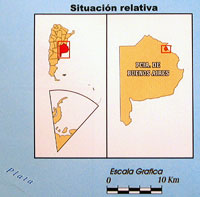
All of this fuss might lead you to assume that there is something to be gained by asserting ownership in Antarctica. After all, the silliness between Canada and Denmark in the Arctic had serious geopolitics behind it. The Northwest Passage will soon beocme navigable as a result of global warming, and Canada wants to bolster its argument that the passage runs through Canadian territorial waters. There may also be oil lurking near Hans Island, giving both countries a further incentive to be stubborn.
None of this holds true for the Antarctic. Even if it became a tropical island paradise, the continent would remain one of the most inaccessible places on Earth, not particularly useful for shipping unless there were a truly enormous spike in trade between Australia and, say, Uruguay. And the only natural resources worth exploiting in Antarctica are the strictly old-school kind - seals, whales and bird poop - that saw their heyday in the late 19th century, back during the first rush of Antarctic exploration. Even assuming you found oil in massive quantities right off the Antarctic coast, it's not at all clear how it could be profitably exploited. Giant icebergs circle the continent, after all, and an average-sized iceberg will shear off an oil platform like a razor takes off a piece of stubble. No matter how you do it, it would cost less to extract hard-to-reach oil from existing fields than it would to exploit even the biggest virgin field in the Antarctic. What is going on now boils down to that most annoying and pedestrian of reasons, small-country nationalism.
We've been conditioned by National Geographic and the Discovery channel to speak of Antarctica in hushed superlatives and treat it as an awesome spectacle of God's Creation. But it is worth pointing out that Antarctica is an armpit. By any objective standard, the place is cold, sterile, windy, dry, and has no night life to speak of. The nearest land mass is remote and windy Tierra del Fuego, which nevertheless comes out looking like Las Vegas by comparison. The only people genuinely excited about Antarctica are climatologists, who inevitably go there just to make dire discoveries that bring everybody else down, and astronomers, who resent human settlement and the atmosphere and are overjoyed to find a place with very little of either. Exobiologists get very excited about Antarctica as a laboratory for what life might look like in more exotic environments, like Mars or the moons of Jupiter, but this just serves as a useful reminder that life on earth has decided to take a pass on Antarctica. In a world where entire species of ants specialize in X-treme environments like 130 degree Nubian sands, the largest land species to choose Antarctica is a midge. This is not prime real estate, no matter how nice that wedge looks on the map.
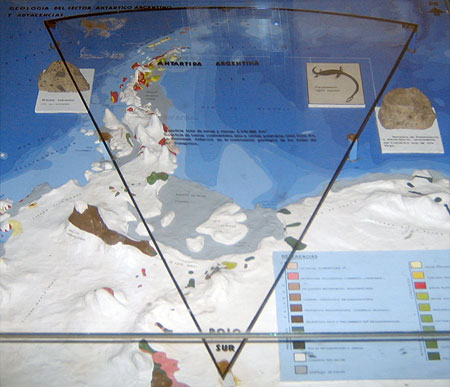
The reason you won't soon see Norwegian ice-tanks crushing the bones of New Zealand infantry under their spiked treads is the Antarctic Treaty System, a set of agreements that keeps things from getting out of hand on the Antarctic continent. It freezes all territorial claims to the continent (no one can resist making this pun) and prohibits new claims from being made. Everyone is allowed to do scientific research, no one is allowed to mine anything, and in the treaty's most inspired article, nothing anyone does can affect their existing claims to sovereignty. This means that the Chileans can build a giant research station next to an existing British one without forcing the Foreign Office to send a telegram of protest, let alone launch a task force from Southampton. The treaty has its origins in the Cold War, when the United States was predictably concerned about a Red Antarctica (the Russians have a defensible claim to discovering the continent) and the rest of the Antarctic claimants were concerned that they would have to go through the colossal bother of stationing soldiers there. After a successful experiment in coordinated scientific exploration during the International Geophysical Year (itself modelled on earlier International Polar Years), all parties decided it would be better to set the Antarctic aside, and the Antarctic treaty was duly signed in 1959. Since then it has been expanded numerous times.
Some of the claims to Antarctica are by now vestigial. The Norwegian slice dates to immediately before the Second World War, when Germans were intensively scouting the Antarctic coast (landing and air-dropping swastika all over what was to become New Swabia). The Norwegians thought they could pre-empt the Germans by claiming the territory for themselves, a problem the Germans solved by attacking Norway. The Australians inherited their claim from the United Kingdom, back in the heady days of Empire when the British would annex anything they could land a boat on, and have been down-playing it ever since in favor of multinational stewardship. The United Kingdom and France are notorious for collecting overseas dependencies to sustain their faded self-image, but even they have the good sense to leave the white triangle off their maps. The South Americans, on the other hand, have made ownership of Antarctica an issue of of national pride.
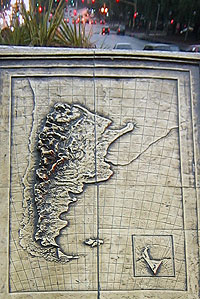 The Chilean desire for Antarctica is at least understandable. Antarctica offers Chile a vital natural resource it sorely lacks—width. But the Argentine preoccupation with the Antarctic is hard not to ridicule. Argentina already has a giant, unpopulated, cold wedge-shaped expanse of barren southerly nothingness, called Patagonia. There is no shortage of space there and it is comes conveniently ice-free and already attached to the rest of the country. The only reason for Argentina to cling to its Antarctic dreams is to sustain a certain delusion of grandeur, fed by rancor over the Falkland Islands war. Maps here often mark the South Atlantic Ocean as the Argentine Sea, after all. A presence in Antarctica is a key part of some nebulous notion of national destiny.
The Chilean desire for Antarctica is at least understandable. Antarctica offers Chile a vital natural resource it sorely lacks—width. But the Argentine preoccupation with the Antarctic is hard not to ridicule. Argentina already has a giant, unpopulated, cold wedge-shaped expanse of barren southerly nothingness, called Patagonia. There is no shortage of space there and it is comes conveniently ice-free and already attached to the rest of the country. The only reason for Argentina to cling to its Antarctic dreams is to sustain a certain delusion of grandeur, fed by rancor over the Falkland Islands war. Maps here often mark the South Atlantic Ocean as the Argentine Sea, after all. A presence in Antarctica is a key part of some nebulous notion of national destiny.
This stuff would be harmless if it weren't so distracting. New Zealand, after all, has a grand old time asserting ownership of the Ross ice shelf without hurting anyone. But Chile and Argentina are not New Zealand; operating vanity bases on an ice sheet wastes resources that could be put to much better use back home. It also undermines the very idea of nationhood these countries are so gung-ho about—there's nothing quite like long straight lines on a blank map to remind you that this business is arbitrary. It's like believing that everyone has to support a certain sports team: this barren archipelago belongs to the Orioles, this sweep of tundra goes to the Cubs. The fact that we can get so worked up about flags in ice (or the Cubs, for that matter) suggests that we are not going to be ridding ourselves of tribalism anytime soon.
| « Junin De Los Andes | The Collapse of the Perito Moreno » |
brevity is for the weak
Greatest Hits
The Alameda-Weehawken Burrito TunnelThe story of America's most awesome infrastructure project.
Argentina on Two Steaks A Day
Eating the happiest cows in the world
Scott and Scurvy
Why did 19th century explorers forget the simple cure for scurvy?
No Evidence of Disease
A cancer story with an unfortunate complication.
Controlled Tango Into Terrain
Trying to learn how to dance in Argentina
Dabblers and Blowhards
Calling out Paul Graham for a silly essay about painting
Attacked By Thugs
Warsaw police hijinks
Dating Without Kundera
Practical alternatives to the Slavic Dave Matthews
A Rocket To Nowhere
A Space Shuttle rant
Best Practices For Time Travelers
The story of John Titor, visitor from the future
100 Years Of Turbulence
The Wright Brothers and the harmful effects of patent law
Every Damn Thing
Your Host
Maciej Cegłowski
maciej @ ceglowski.com
Threat
Please ask permission before reprinting full-text posts or I will crush you.